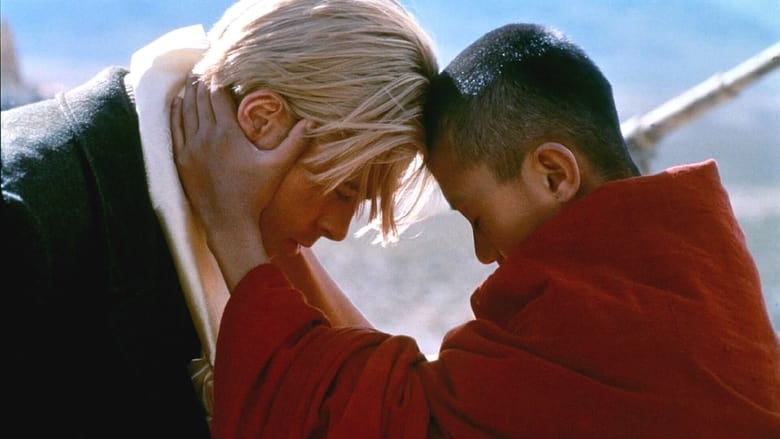Seven Years in Tibet (1997)
Austrian mountaineer, Heinrich Harrer journeys to the Himalayas without his family to head an expedition in 1939. But when World War II breaks out, the arrogant Harrer falls into Allied forces' hands as a prisoner of war. He escapes with a fellow detainee and makes his way to Llaso, Tibet, where he meets the 14-year-old Dalai Lama, whose friendship ultimately transforms his outlook on life.
Watch Trailer
Cast


Similar titles
Reviews
This was a controversial film upon release and if I am not wrong its outright banned in China. It's a good film based on the real experiences of an Austrian explored and the dalai lama during some difficult period in Tibetian history(basically Chinese Occupation). Brad Pitt plays the lead character and is pretty alright. David Thewlis plays his mate. The child playing the young Dalai Lama steals the show though and the scenery of Tibet is a plus point. Great topic but an average film.
This is a really bad piece of disinformation and propaganda. Harrer is depicted as ant-Nazi, while in his real life he was very proud of the honors he received from Hitler and the photos where he appears with the Nazi boss. As a matter of fact he did not leave Tibet until 1950. Why did he remain there? Was he acting as an "adviser" for some Western power? Was he scared of going back to Austria and being summoned by an anti-Nazi courtroom? Or was he even more afraid to fall in the hands of Chinese judges? After all, he was a Nazi, allied with the Japanese, who had invaded China and killed thousands and thousands of innocent Chinese people. And Aufschnaiter? Did he really remain in the Himalayan areas because he had "married a Tibetan woman"? Or was he similarly afraid to go back to the West? After all, he had joined the Nazi Party in 1933. And so on. Movies should be respectful of History and not play with It and twist It as if It were a toy to use for political amusement.
This is a movie based on a true story about a German mountain climber who hid in Tibet during World War II. Moreso, it is about the final days of the independence of Tibet and more of a protest against China's invasion and war crimes in Tibet. Even with that, the movie focuses on the character and we watch how he changes during the time he spends here, and how he grows to understand himself.The movie begins with him running away from his responsibilities to his wife. His wife is about to have a baby, but he really does not want to be around. Instead he wants to climb Mount Everest and be the first person up there. This attitude ends up pushing his wife further away from him, and he discovers later that when he wants her, she is no longer there to help him.This is important as it develops his character, but moreso it has to do with his son. He is imprisoned in a British POW camp in India and as such he never gets the chance to see his kid. Even though he has no interest in fighting the war, he does not want to be a prisoner either, so he constantly tries to escape, finally succeeding with a larger group, but being a very independent person he insists on going off on his own. But what we learn though is that even though he independent, he also is foolish as he squanders all of his food.Tibet comes into it as he wishes to flee there to escape the British. Even then, the Tibetans do not want them in their land because they are simply foreigners, but they manage to escape there, and soon are welcomed in Tibet, especially since they are dying and hungry.The main changes come when the Dali Llama decides that he wishes to meet with this German. He finds this guy's world interesting, and he comes to see the Dali Llama as the son that he never had, but the thing is that the Dali Llama knows that he is not the guy's son. As their relationship grows, so does his understanding of himself, and in the end he finds the courage to return to Germany and to see his son.It is a long movie, but not only is it insightful, and we begin to feel for the plight of the Tibetans, it is also well made. Many films based on true stories generally fall down, but this is quite well done, and I enjoyed it.
Beautifully filmed and well scored, Seven Years in Tibet narrates the story of Austrian mountaineer Heinrich Harrer's journey (both physical and spiritual), his experiences in Lhasa, and his friendship with the child Dalai Lama. Heinrich Harrer's transformation from an emotionally immature and egotistic narcissist to an enlightened and more sensitive man parallels the story of Buddha's path to enlightenment.. Buddhism's underlying doctrine is that of compassion and it offers it's adherents a way of living that will remedy the suffering of the human condition. Harrer's discontent is his suffering. Prior to his journey to Tibet, Harrer's marriage is falling apart and he openly resents Aufschnaiter, the leader of the expedition to the Himalayas. Through his friendship with the Dalai Lama and the detachment from his "European way of life", Harrer learns to leave behind his selfish tendencies. He grows to regret abandoning his pregnant wife in favor of his own ambitions and manages to overcome his jealousy of Aufschnaiter for marrying Pema Lhaki. The wisdom that he gains from the Dalai Lama and Buddhist teachings even drives him to leave his beloved Tibet to return to Austria in order to make amends with his wife and son. As he deals with the challenges of scaling Nanga Parbet (the ninth highest mountain range in the world and the death of dozens of mountaineers before him), as well as the political turmoil of World War 2 Europe, he so too deals with his own demons and, despite not formally converting to Buddhism, adapts the clarity of a Buddhist way of life.














